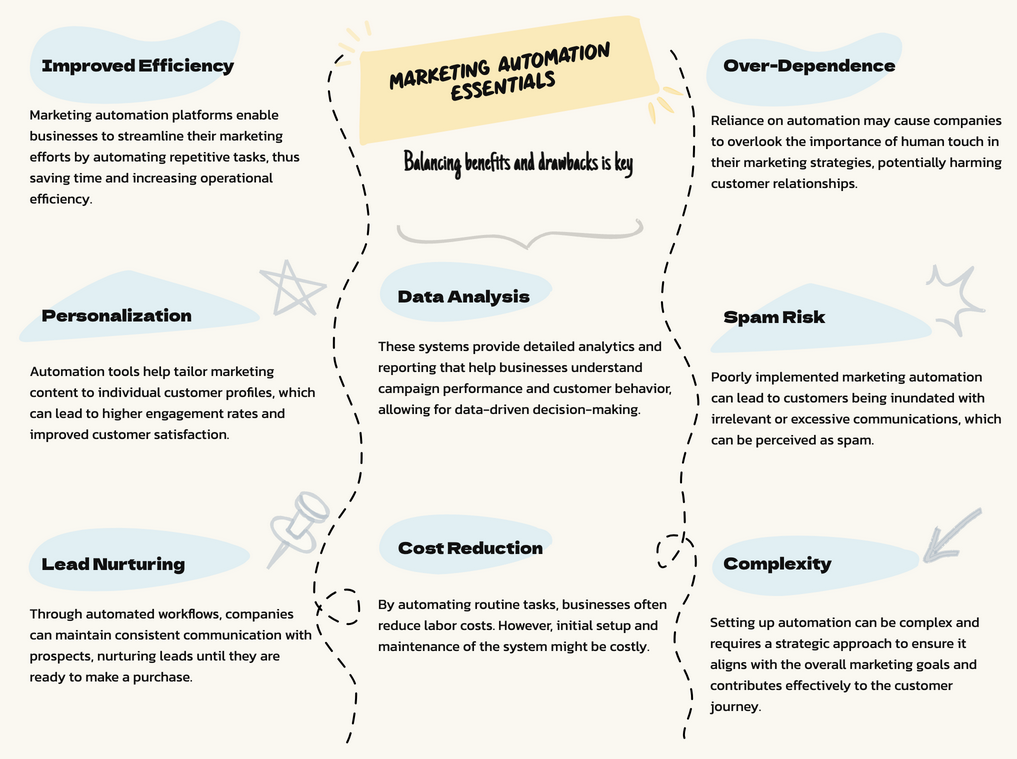Did you know that companies using marketing automation for lead nurturing experience a 451% increase in qualified leads? This impressive statistic demonstrates the power of marketing automation when used effectively.

Marketing automation has become a popular buzzword in the digital marketing world, but what exactly does it entail? In this article, we will explore the benefits, disadvantages, and misconceptions surrounding marketing automation. We will also delve into strategies, best practices, and the importance of lead generation in maximizing the potential of marketing automation.
Whether you’re new to marketing automation or looking to enhance your existing strategy, this article will provide valuable insights and practical tips to help you make the most of this powerful tool.
Key Takeaways:
- Marketing automation can lead to a significant increase in qualified leads.
- This article will explore the benefits, disadvantages, and misconceptions surrounding marketing automation.
- Effective marketing automation strategies can transform marketing efforts and drive business growth.
- Lead generation plays a crucial role in the success of marketing automation.
- The right marketing automation software is essential for achieving the desired results.
The Benefits of Marketing Automation
Marketing automation offers a wide range of benefits that can significantly enhance your marketing efforts and drive business growth. By implementing effective marketing automation strategies and utilizing automation tools, you can streamline your marketing processes and create personalized experiences for your prospects.
1. Effective Marketing Communication
One of the key benefits of marketing automation is the ability to communicate with multiple online channels, such as email, social media, and website interactions. By automating repetitive tasks, such as sending personalized emails or posting on social media, you can ensure consistent and timely communication with your audience. This enables you to stay top-of-mind and engage with prospects throughout their buyer’s journey.
2. Personalized and Relevant Content
Marketing automation allows you to provide personalized and relevant content to your prospects based on their behavior and interests. By leveraging automation tools, you can segment your leads and target messaging that aligns with their specific needs and preferences. This personalized approach builds trust, nurtures leads, and increases the likelihood of converting them into customers.
3. Streamlined Marketing Efforts
Automating repetitive marketing tasks frees up your team’s time and resources, allowing them to focus on strategic initiatives. With automation tools, you can automate email campaigns, lead nurturing workflows, and even social media scheduling. This streamlining of marketing efforts improves efficiency and productivity, enabling your team to work on more impactful projects.
4. Insights into Buyer Behavior
Marketing automation provides valuable insights into the behavior of your buyers. With automation tools, you can track and analyze how your prospects interact with your content, which channels they prefer, and what actions they take. These insights enable you to refine your marketing strategies, tailor your messaging, and continuously improve your marketing automation process for better results.
The Disadvantages of Marketing Automation
While marketing automation offers many benefits, there are also some challenges and pitfalls to consider. Implementing marketing automation can be a complex process that requires a sound strategy and a clear focus on delivering value to the audience. It is essential to create automation workflows that are personalized, relevant, and engaging to avoid alienating customers.
One of the challenges of marketing automation is the initial investment of time and effort required to set up and optimize the automation tools. This includes creating and refining email templates, designing landing pages, and configuring segmentation and personalization rules. Companies must dedicate resources to learn the ins and outs of the automation software to utilize its full potential.
Implementing marketing automation without a deep understanding of the audience and their needs can lead to ineffective marketing and low return on investment. It is important to thoroughly research and understand the target audience to create impactful automation campaigns. A one-size-fits-all approach may result in impersonal interactions and missed opportunities.
Another pitfall of marketing automation is relying too heavily on automation without a steady flow of organic leads. While automation streamlines processes and increases efficiency, it cannot replace the importance of generating new leads. Businesses should focus on a balanced approach that combines automation with strategies for lead generation and nurturing.
| Disadvantages of Marketing Automation | Pitfalls of Marketing Automation | Challenges of Marketing Automation |
|---|---|---|
| Complex implementation process | Impersonal interactions | Investment of time and effort |
| Requires a sound strategy | Ineffective marketing without audience understanding | Dependency on organic lead generation |
| Learning and optimizing automation tools |
By being aware of these disadvantages and pitfalls, businesses can take steps to overcome them and maximize the benefits of marketing automation. A thoughtful and strategic approach, combined with continuous learning and improvement, will ensure that marketing automation drives tangible results.

Misconceptions about Marketing Automation
One common misconception is that marketing automation is a magic solution that will instantly generate leads and grow a business exponentially. However, successful marketing automation requires careful planning, analysis, and iteration. It is not a replacement for a great product, tight processes, or human effort. Understanding what marketing automation can and cannot do is crucial to avoiding unrealistic expectations.
Let’s debunk some misconceptions about marketing automation:
Misconception: Marketing automation is a cure-all for lead generation
Many people believe that implementing marketing automation is all it takes to drive leads and instantly grow their business. However, marketing automation is just a tool—it is not a substitute for a great product or effective marketing strategies. It requires a solid foundation and tailored campaigns to succeed. Without a strategic approach and well-defined objectives, automation alone cannot generate the desired results.
Misconception: Marketing automation eliminates the need for human effort
Some think that marketing automation can completely replace human effort, making marketing teams redundant. While automation can handle repetitive tasks and streamline processes, it still requires human intelligence, creativity, and strategy. Successful marketing automation relies on the collaboration between technology and human expertise. Automation tools should be viewed as a valuable assistant that helps marketers optimize their efforts, not a replacement for their expertise.
Misconception: Marketing automation guarantees immediate results
Another misconception is that marketing automation will deliver instant results. However, just like any marketing strategy, it takes time and continuous optimization to see significant results. Marketing automation requires monitoring, testing, and refining to improve performance and effectiveness. Patience and long-term commitment are key to achieving success with marketing automation.
| Common Misconceptions | Reality |
|---|---|
| Marketing automation is a magic solution that guarantees instant success | Marketing automation requires planning, analysis, and iteration to be effective |
| Marketing automation can replace the need for human effort | Marketing automation complements human expertise, but cannot replace it entirely |
| Marketing automation delivers immediate results | Marketing automation takes time and continuous optimization to see significant results |
Understanding the misconceptions surrounding marketing automation is crucial to implementing it effectively. By setting realistic expectations and leveraging automation as a tool to enhance human efforts, businesses can unlock the true potential of marketing automation and drive sustainable growth.
Marketing Automation Strategies and Best Practices
To make the most of marketing automation, we need to develop effective strategies and follow best practices. By doing so, we can optimize our campaigns and achieve the desired results. Here are some key strategies and best practices to consider:
1. Define Clear Campaign Objectives
Before implementing marketing automation, it’s important to have clear campaign objectives in mind. Identify what you want to achieve, whether it’s increasing brand awareness, generating leads, or nurturing existing customers. Clearly defined objectives will help guide your automation efforts and measure success.
2. Segment Leads
Segmenting leads allows us to target specific groups of individuals based on their interests, behaviors, and demographics. By segmenting our audience, we can deliver more personalized and relevant messages, increasing engagement and conversion rates. Consider segmenting based on factors such as industry, job title, purchase history, or engagement level.
3. Target Messaging Based on the Buyer’s Journey
Understanding the buyer’s journey is crucial for effective marketing automation. Map out the different stages of the buyer’s journey – awareness, consideration, and decision – and tailor messaging accordingly. Provide educational content during the awareness stage, product comparisons during the consideration stage, and promotional offers during the decision stage.
4. Continuously Analyze Data to Make Improvements
Data analysis is a vital part of marketing automation. Regularly monitor key metrics such as open rates, click-through rates, and conversion rates to identify areas for improvement. Use this data to refine your campaigns, make data-driven decisions, and optimize your automation strategy.
5. Use the Right Marketing Automation Tools
Choosing the right marketing automation tools is essential for success. Look for tools that offer comprehensive features, intuitive interfaces, and seamless integration with your existing systems. Some popular marketing automation tools include HubSpot, Marketo, and Pardot. Evaluate your needs and budget to find the best fit for your business.

Implementing these marketing automation strategies and best practices will help us maximize the benefits of automation and achieve our marketing goals. Remember to consistently evaluate and adapt your strategies based on data and customer feedback for continuous improvement and success.
Working with Marketing Automation Consulting/Agency Partners
When it comes to implementing marketing automation, businesses can benefit greatly from partnering with marketing automation consulting or agency partners. These partners offer a wealth of expertise and specialized knowledge that can guide businesses through the implementation process, help develop effective strategies, and provide ongoing support.
Marketing automation consulting and agency partners understand the complexities of marketing automation technology and can help businesses navigate through them. They have experience working with various automation tools and can ensure successful implementation and utilization of the technology to achieve desired outcomes.
Deciding whether to work with a marketing automation consulting or agency partner or build an in-house team depends on the specific needs and resources of the business. It’s important to consider factors such as budget, expertise required, and the level of support needed throughout the implementation and optimization process.
Partnering with marketing automation consulting or agency partners brings several advantages:
- Access to experts with in-depth knowledge of marketing automation
- Guidance in developing effective strategies based on industry best practices
- Ongoing support for troubleshooting and optimizing automation processes
- Expertise in integrating automation tools with other marketing technologies
Working with a partner allows businesses to tap into specialized knowledge and experience, helping them avoid common pitfalls and achieve better results with their marketing automation efforts.
Let’s explore a case study to see how a marketing automation agency helped a company improve their lead nurturing process:
A leading e-commerce company, XYZ, was struggling with their lead nurturing process. They had implemented marketing automation but were not seeing the desired results. With the help of a marketing automation agency, XYZ identified gaps in their strategy and made necessary adjustments. The agency provided guidance in developing targeted messaging based on the buyer’s journey, segmenting leads, and analyzing data for continuous improvement. As a result, XYZ experienced a 30% increase in lead conversion rates and a significant boost in revenue.
Case Study: Improving Lead Nurturing Process with Marketing Automation Agency
Table: Before and After Implementing Marketing Automation Agency
| Metric | Before | After |
|---|---|---|
| Lead Conversion Rate | 10% | 30% |
| Revenue | $500,000 | $750,000 |
This case study demonstrates the impact of working with a marketing automation agency. By leveraging their expertise and implementing targeted strategies, businesses can achieve significant improvements in lead conversion rates and revenue.
Partnering with a marketing automation consulting or agency partner can save businesses time, resources, and effort by leveraging the expertise of professionals who are well-versed in marketing automation implementation and best practices. It allows businesses to focus on their core competencies while benefiting from the specialized knowledge of marketing automation experts.

Finding the Right Marketing Automation Partner
When it comes to marketing automation, finding the right partner is crucial for success. Businesses need a partner that understands their specific needs, has the expertise required, and fits within their budget constraints. At [Company Name], we recognize the importance of finding a marketing automation partner that can meet these criteria.
Our team of experienced professionals is well-versed in marketing automation strategies and best practices. We take the time to understand your business goals and objectives, ensuring that our expertise aligns with your needs. Whether you need assistance with implementation, strategy development, or ongoing support, we have you covered.
The Importance of Expertise
Expertise is a key factor to consider when choosing a marketing automation partner. You want to work with a team that has deep knowledge and understanding of marketing automation tools and techniques. At [Company Name], our experts have years of experience in the field and stay up to date with the latest trends and innovations.
By partnering with us, you can tap into our expertise to develop effective marketing automation strategies. We can help you define clear campaign objectives, segment your leads, and target messaging based on the buyer’s journey. With our guidance, you can make the most of your marketing automation efforts and maximize results.
Pricing Models that Work for You
We understand that budget constraints are a reality for businesses of all sizes. That’s why we offer flexible pricing models that cater to your specific needs. Our goal is to provide you with the right level of expertise at a price that fits within your budget.
Whether you prefer a monthly subscription model or a customized pricing package, we have options to accommodate your requirements. Our transparent pricing ensures that you know exactly what you’re paying for, without any hidden fees or surprises.
References from Satisfied Clients
When making a decision about a marketing automation partner, it’s important to hear from others who have worked with them. At [Company Name], we have a proven track record of success and satisfied clients.
We can provide you with references from past clients who have benefited from our expertise and services. Their testimonials and feedback can give you confidence in our capabilities and help you make an informed decision.
Make an Informed Decision
When it comes to finding the right marketing automation partner, you need a team that understands your goals, has the expertise required, and offers flexible pricing models. At [Company Name], we check all the boxes.
Reach out to us today to discuss your marketing automation needs and learn how we can help you achieve your business objectives.

| Benefits of Choosing [Company Name] as Your Marketing Automation Partner | Why [Company Name] Stands Out |
|---|---|
| Expertise in marketing automation strategies and best practices | Years of experience and knowledge in the field |
| Flexible pricing models tailored to your budget | Transparent pricing with no hidden fees |
| References from satisfied clients | Proven track record of success |
| Personalized support and guidance | Tailored solutions to meet your specific needs |
The Importance of Lead Generation in Marketing Automation
Lead generation is a vital component of any successful marketing automation strategy. Without a consistent influx of high-quality leads, marketing automation efforts may fall short in delivering the desired results. At [Company Name], we understand the critical role that lead generation plays in maximizing the benefits of marketing automation.
Generating new, organic leads allows us to nurture and develop a robust pipeline of potential customers. By implementing effective lead scoring and ranking systems, we can target our messaging to specific individuals based on their interests, preferences, and engagement levels. This personalized approach enhances the effectiveness of our lead nurturing and conversion efforts, ultimately boosting our marketing automation results.
The Benefits of Inbound Leads
“Quality leads are the lifeblood of successful marketing automation. By attracting inbound leads who are actively seeking solutions, we ensure that our efforts are focused on individuals who are more likely to engage with our messaging and become valuable customers.”
By focusing on inbound lead generation, we attract individuals who are already interested in the products or services we offer. These leads come to us through various channels, such as organic search, social media, and referrals. Inbound leads are more likely to engage with our messaging and be receptive to the solutions we provide, increasing the chances of successful conversion and long-term customer relationships.
At [Company Name], we utilize a multifaceted lead generation approach that incorporates various strategies, including content marketing, search engine optimization (SEO), social media marketing, and targeted advertising campaigns. This comprehensive approach enables us to attract a diverse range of qualified leads, ensuring a steady flow of potential customers into our marketing automation system.
The Power of Marketing Automation and Lead Generation
When combined with marketing automation, lead generation becomes even more impactful. Through automation, we can leverage the data and insights gained from lead generation efforts to deliver personalized and timely messages to our target audience. By guiding leads through a nurturing process that aligns with their specific needs and interests, we increase the likelihood of conversion and customer satisfaction.
Image:

With marketing automation, we can automate various lead generation activities, such as lead capture forms, email campaigns, and lead scoring. These automated processes save us time and resources while ensuring a systematic and efficient approach to lead management. By automating lead generation, we can maximize the scalability and effectiveness of our marketing efforts, allowing us to focus on nurturing relationships with our leads.
If you’d like to learn more about how our marketing automation strategies can help generate high-quality leads for your business, contact us today.
The Impact of Marketing Automation Software
Selecting the right marketing automation software is crucial for success. With the power to streamline marketing efforts and enhance customer engagement, the software you choose can significantly impact your revenue and overall marketing ROI.
Poorly executed automation efforts can result in spammy and ineffective automated messages, damaging your brand reputation and hindering customer relationships. Ensuring that your automated messages are targeted, relevant, and personalized is essential to keep your audience engaged and interested in your offerings.
To prevent your communication from ending up in the spam folder, it is vital to prioritize email deliverability. Optimize your email marketing campaigns, authenticate your domain, monitor your email reputation, and implement email best practices to increase the chances of your messages reaching your customers’ inboxes.
For improved email deliverability and engaging communication, implement a decision tree within your marketing automation software. By segmenting your contacts and sending tailored messages based on prospect behavior, you can provide a more personalized experience and increase the likelihood of conversion.

“Choosing the right marketing automation software is like choosing the right tool for a job. It can make all the difference in the results you achieve.” – Marketing Expert
When it comes to building your contact list, avoid the temptation to purchase lists of contacts. Instead, focus on generating quality leads organically through targeted marketing efforts and lead nurturing strategies. This approach ensures that you have an engaged, interested audience to whom your automated messages will resonate.
Spam is a constant concern in the digital marketing realm. To avoid being flagged as spam, employ best practices such as obtaining explicit consent from your contacts, providing clear opt-out options, and regularly cleaning your contact list to remove inactive or disinterested subscribers.
In summary, selecting the right marketing automation software is vital for the success of your automation efforts. By avoiding spammy messages, prioritizing email deliverability, and focusing on generating quality leads, you can maximize the impact of your marketing automation software and achieve significant results for your business.
Conclusion
In conclusion, marketing automation has emerged as a powerful tool for businesses when implemented correctly. When businesses leverage marketing automation effectively, it can provide numerous benefits such as personalized communication, improved efficiency, and increased revenue. By utilizing marketing automation tools, companies can create tailored experiences for their customers, leading to higher engagement and customer satisfaction.
However, it is essential for businesses to be aware of the challenges and potential pitfalls associated with marketing automation. Implementing marketing automation requires a strategic approach and a deep understanding of the audience’s needs and preferences. Businesses must continuously learn and adapt, leveraging data and insights to refine their automation processes.
Working with the right partners and developing effective strategies are crucial elements of successful marketing automation. Whether through in-house teams or marketing automation consulting agencies, businesses can benefit from the expertise and support of professionals who specialize in this area. Additionally, generating high-quality leads organically is essential to maximizing the effectiveness of marketing automation.
With the right approach and a focus on continuous improvement, marketing automation can transform marketing efforts and contribute to significant business growth. It can enable businesses to deliver relevant and personalized content, enhance operational efficiency, and drive revenue-generating opportunities. By harnessing the power of marketing automation, businesses can stay ahead in an increasingly competitive digital landscape and connect with their customers in meaningful ways.
How Can Marketing Automation Contribute to Sustainable Change in Advertising?
Marketing automation can streamline the process of advertising for sustainable change. By leveraging technology, businesses can target specific audiences, personalize messaging, and analyze metrics to make informed decisions. This approach not only increases efficiency but also contributes to long-term, impactful change in advertising practices.
FAQ
What are the benefits of marketing automation?
Marketing automation offers multiple benefits, including the ability to communicate with multiple online channels, automate repetitive tasks, and gain insights into buyer behavior. It allows companies to provide personalized and relevant content to prospects, nurturing them into customers and increasing revenue. Marketing automation tools also help streamline marketing efforts and improve overall effectiveness.
What are the disadvantages of marketing automation?
While marketing automation has many benefits, there are also challenges and pitfalls to consider. Implementation can be complex, requiring a sound strategy and clear focus on delivering value to the audience. Companies must also invest time and effort in learning and optimizing the automation tools. Additionally, relying too heavily on automation without a steady flow of organic leads can lead to ineffective marketing and low ROI.
What are some common misconceptions about marketing automation?
One common misconception is that marketing automation is a magic solution that will instantly generate leads and grow a business exponentially. However, successful marketing automation requires careful planning, analysis, and iteration. It is not a replacement for a great product, tight processes, or human effort. Understanding what marketing automation can and cannot do is crucial to avoiding unrealistic expectations.
What are some effective marketing automation strategies and best practices?
To make the most of marketing automation, companies should develop effective strategies and follow best practices. This includes defining clear campaign objectives, segmenting leads, targeting messaging based on the buyer’s journey, and continuously analyzing data to make improvements. Using the right marketing automation tools can also enhance the effectiveness of the strategies and streamline processes.
Should companies consider working with marketing automation consulting or agency partners?
Yes, partnering with marketing automation consulting or agency partners can provide businesses with access to experts and specialized knowledge. These partners can offer guidance in implementation, strategy development, and ongoing support. They can also help businesses navigate the complexities of marketing automation and ensure successful implementation and utilization of the technology. Deciding whether to work with a partner or build an in-house team depends on the specific needs and resources of the business.
How can businesses find the right marketing automation partner?
When searching for a marketing automation partner, businesses should consider their specific needs, expertise required, and budget constraints. It is important to find a partner that understands the business’s goals and can provide the right level of expertise at a reasonable price. Flexible pricing models and references from past clients can help in making an informed decision.
What is the importance of lead generation in marketing automation?
Lead generation plays a critical role in the success of marketing automation. Without a steady flow of quality leads, marketing automation efforts can fail to deliver results. It is crucial for marketers to focus on generating new organic leads to nurture and develop a pipeline. Targeting messaging based on lead scoring and ranking can help ensure effective lead nurturing and conversion.
How does marketing automation software impact marketing efforts?
Selecting the right marketing automation software is crucial for success. Poorly executed automation efforts can result in spammy and ineffective automated messages. It is important to avoid buying lists of contacts and instead focus on generating quality leads organically. Targeting messaging based on prospect behavior and implementing a decision tree can help ensure relevant and engaging communication. The right marketing automation software can significantly impact revenue and overall marketing ROI.
What are the benefits and challenges of marketing automation?
Benefits of marketing automation include personalized user experience, automated repetitive tasks, and insights into buyer behavior. However, challenges include complex implementation, learning and optimizing the automation tools, and the necessity of a steady flow of organic leads for effective marketing.
What is marketing automation?
Marketing automation refers to the use of software and technology to automate repetitive marketing tasks and workflows. It allows companies to streamline their marketing efforts, personalize communication, and gain insights into buyer behavior. Marketing automation can significantly improve the efficiency and effectiveness of marketing campaigns.










